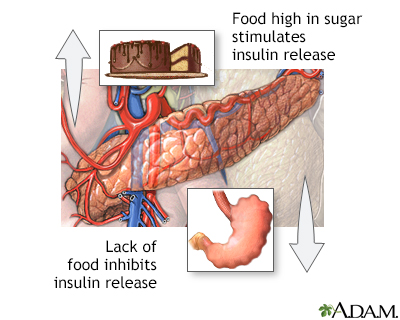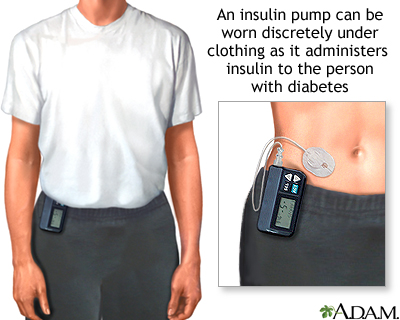Diabetic ketoacidosis
DKA; Ketoacidosis; Diabetes - ketoacidosis
Diabetic ketoacidosis (DKA) is a life-threatening problem that affects people with diabetes. It occurs when the body starts breaking down fat at a rate that is much too fast. The liver processes the fat into a fuel called ketones, which causes the blood to become acidic.
Images


Causes
DKA happens when the signal from insulin in the body is so low that:
- Blood sugar (glucose) can't go into cells to be used as a fuel source.
- The liver makes a large amount of glucose.
- Fat is broken down too rapidly for the body to process.
The fat is broken down by the liver into a fuel called ketones. Ketones are normally produced by the liver when the body breaks down fat after it has been a long time since your last meal. These ketones are normally used by the muscles and the heart. When ketones are produced too quickly and build up in the blood, they can be toxic by making the blood acidic. This condition is known as ketoacidosis.
DKA is sometimes the first sign of type 1 diabetes in people who have not yet been diagnosed with diabetes. It can also occur in someone who has already been diagnosed with type 1 diabetes. Infection, injury, a serious illness, missing doses of insulin shots, or the stress of surgery can lead to DKA in people with type 1 diabetes.
People with type 2 diabetes can develop euglycemic DKA or hyperosmolar hyperglycemic state. It is usually triggered by prolonged uncontrolled blood sugar, missing doses of medicines, as a side effect of some medicines, or a severe illness or infection.
Symptoms
Common symptoms of DKA can include:
- Decreased alertness
- Deep, rapid breathing
- Dehydration
- Dry skin and mouth
- Flushed face
- Frequent urination or thirst that lasts for a day or more
- Fruity-smelling breath
- Headache
- Muscle stiffness or aches
- Nausea and vomiting
- Stomach pain
Exams and Tests
Ketone testing may be used in type 1 diabetes to check for early ketoacidosis. The ketone test is usually done using a urine sample or a blood sample.
Ketone testing is usually done when DKA is suspected:
- Most often, urine testing is done first.
- If the urine is positive for ketones, most often a ketone called beta-hydroxybutyrate is measured in the blood. This is the most common ketone measured. The other main ketone is acetoacetate.
Other tests for ketoacidosis include:
- Arterial blood gas
- Basic metabolic panel, (a group of blood tests that measure your sodium and potassium levels, kidney function, and other chemicals and functions, including the anion gap)
- Blood glucose test
- Blood pressure measurement
- Osmolality blood test
Treatment
The goal of treatment is to correct the high blood sugar level with insulin. Another goal is to replace fluids and bodily chemicals lost through urination, loss of appetite, and vomiting if you have these symptoms.
If you have diabetes, it is likely your health care provider told you how to spot the warning signs of DKA. If you think you have DKA, test for ketones using urine strips. Some glucose meters can also measure blood ketones. If ketones are present, contact your provider right away. Do not delay. Follow any instructions you are given.
It is likely that you will need to go to the hospital. There, you will receive insulin, fluids, and other treatment for DKA. Then providers will also search for and treat the cause of DKA, such as an infection.
Outlook (Prognosis)
Most people respond to treatment within 24 hours. Sometimes, it takes longer to recover.
If DKA is not treated, it can lead to severe illness or death.
Possible Complications
Health problems that may result from DKA include any of the following:
- Fluid buildup in the brain (cerebral edema)
- Heart stops working (cardiac arrest)
- Kidney failure
When to Contact a Medical Professional
DKA is a medical emergency. Contact your provider if you notice symptoms of DKA.
Go to the emergency room or call 911 or the local emergency number if you or a family member with diabetes has any of the following:
- Decreased consciousness
- Fruity breath
- Nausea and vomiting
- Trouble breathing
Prevention
If you have diabetes, learn to recognize the signs and symptoms of DKA. Know when to test for ketones, such as when you are sick.
If you use an insulin pump, check often to see that insulin is flowing through the tubing. Make sure the tube is not blocked, kinked or disconnected from the pump.
Related Information
DiabetesMetabolism
Blood sugar test
Heart attack
Acute kidney failure
References
American Diabetes Association Professional Practice Committee. 2. Diagnosis and classification of diabetes: standards of care in diabetes-2025. Diabetes Care. 2025;48(Supplement_1):S27-S49. PMID: 39651986 pubmed.ncbi.nlm.nih.gov/39651986/.
Gillard P, Atkinson MA, Mathieu C. Type 1 diabetes mellitus. In: Melmed S, Auchus RJ, Goldfine AB, Rosen CJ, Kopp PA, eds. Williams Textbook of Endocrinology. 15th ed. Philadelphia, PA: Elsevier; 2025:chap 35.
Maloney GE, Glauser JM. Diabetes mellitus and disorders of glucose homeostasis. In: Walls RM, ed. Rosen's Emergency Medicine: Concepts and Clinical Practice. 10th ed. Philadelphia, PA: Elsevier; 2023:chap 115.
BACK TO TOPReview Date: 1/10/2025
Reviewed By: Sandeep K. Dhaliwal, MD, board-certified in Diabetes, Endocrinology, and Metabolism, Springfield, VA. Also reviewed by David C. Dugdale, MD, Medical Director, Brenda Conaway, Editorial Director, and the A.D.A.M. Editorial team.

Health Content Provider
06/01/2025
|
A.D.A.M., Inc. is accredited by URAC, for Health Content Provider (www.urac.org). URAC's accreditation program is an independent audit to verify that A.D.A.M. follows rigorous standards of quality and accountability. A.D.A.M. is among the first to achieve this important distinction for online health information and services. Learn more about A.D.A.M.'s editorial policy, editorial process and privacy policy. A.D.A.M. is also a founding member of Hi-Ethics. This site complied with the HONcode standard for trustworthy health information from 1995 to 2022, after which HON (Health On the Net, a not-for-profit organization that promoted transparent and reliable health information online) was discontinued. |
The information provided herein should not be used during any medical emergency or for the diagnosis or treatment of any medical condition. A licensed medical professional should be consulted for diagnosis and treatment of any and all medical conditions. Links to other sites are provided for information only -- they do not constitute endorsements of those other sites. © 1997- 2025 A.D.A.M., a business unit of Ebix, Inc. Any duplication or distribution of the information contained herein is strictly prohibited.
